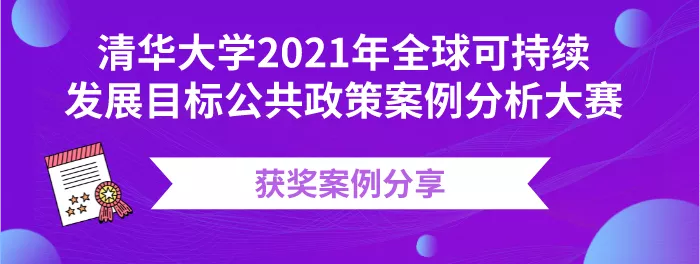
From April to August, the 2021 Tsinghua International Case Analysis Competition of Public Policy on Sustainable Development Goals (SDGs) was successfully held. This competition was co-organized by the China Case Center for Public Policy and Management at SPPM of Tsinghua University and the Institute for Sustainable Development Goals of Tsinghua University. The competition aims to encourage global students from different courtiers, cultures, universities and professional backgrounds to pay attention to SDG public policy issues, develop academic analytical skills and critical thinking abilities by discussing complex and real-life scenarios. This year’s competition attracted 49 teams from 53 universities and colleges across China, the U.S., the U.K., Switzerland, Singapore, Ireland, Australia and Germany, with a total of 147 participants. Team “Lion Consulting Group (LCG)” won the third prize in the master student competition with case analysis report "Achieving SDG 9: Challenges and Potentials of Adopting PPP in Public Infrastructure Investment - A Case Study of Anqing".
Author
LI Xun (李旬), Columbia University
MAO Tianyu (毛天羽), Columbia University
PAN Xianxing (潘先行), Columbia University
Keywords
PPP, sustainable urbanization, green infrastructure investment
Case Overview
In the backdrop of China’s announcement of its 3060 Carbon Goals, its commitment to green investment in infrastructure in BRI countries, and the global momentum of SDGs, the Anqing city government launched the first-ever Public-Private Partnership (PPP) project on building New Energy Electric Vehicle (NEV) charging infrastructure in China. In this case study of Anqing, the authors explored the challenges and potentials of the PPP approach in green infrastructure investment through both qualitative and quantitative analyses. The authors qualitatively evaluated the NEV project in Anqing based on five criteria: knowledge and experience in PPP; institution building; value for money; risk allocation and equity; and bankability and cost of finance. Extracting data from published government documents and contracts, the authors in addition projected the Net Present Value of this project under multiple scenarios in a life period of 20 years. Based on qualitative and quantitative analyses, the authors contend that there is huge competence in financing NEV charging infrastructure via PPP while identifying key challenges within it, and highlighting key lessons for peer governments in achieving SDG 9.
Experience Sharing
The Tsinghua International Case Analysis Competition of Public Policy on SDGs provides a valuable global platform for policy students to present critical thinking of the young generation, apply what we have learned from school, and address critical issues in the field of our interests. Furthermore, such a competition focusing on SDGs is relevant and timely against the backdrop of the Decade of Actions. The young generation participating in the competition will also be key contributors to deliver on the ambitious, universal and inclusive 2030 Agenda.
The three of us are grateful to have this opportunity to conduct a study in the synthesis of our interests in various policy areas: cities, energy and environment, and economic development. We are also honored to enter the final round and win the third prize, among all other quality, critical and original works from which we also learned a lot.
Research pathway
We see the four-month engagement in the competition as a simulation of standard operations for practitioners to identify and understand underlying policy issues. We started with selecting a specific Sustainable Development Goal (SDG) to narrow down our focus and proceeded with a broad-scope literature review to identify ongoing policy issues, tensions and debates. SDG 9 (industry, innovation and infrastructure) connects our common areas of interest and specialization, and it represents a proven gravity of domestic public affairs through a great amount of background reading.
Before diving into specific cases, we carefully selected evaluation criteria and constructed a quantitative model to avoid confirmation biases. Taking critical challenges Chinese cities face into account, such as carbon neutrality, new infrastructure, industrial transformation and upgrading, and public financing innovation, etc., we landed on the NEV charging infrastructure PPP project in Anqing. Then we gathered extensive quantitative and qualitative evidence to conduct the evaluation for the PPP project and discussed potentials and limitations.
Personal development
As a team, what we learned from this experience goes beyond what our case study has demonstrated. This learning journey has been very rewarding as we have benefited from effective communication and mutual respect, fast learning, clear work allocation and project management, multitasking and team spirits. It also nourished our minds as public policy students by allowing us to critically understand and discuss concrete real-life policy challenges, which prepares us for our future professional development.

Presenting in the final competition
Written by Team "LCG"
Edited by CCCPPM

